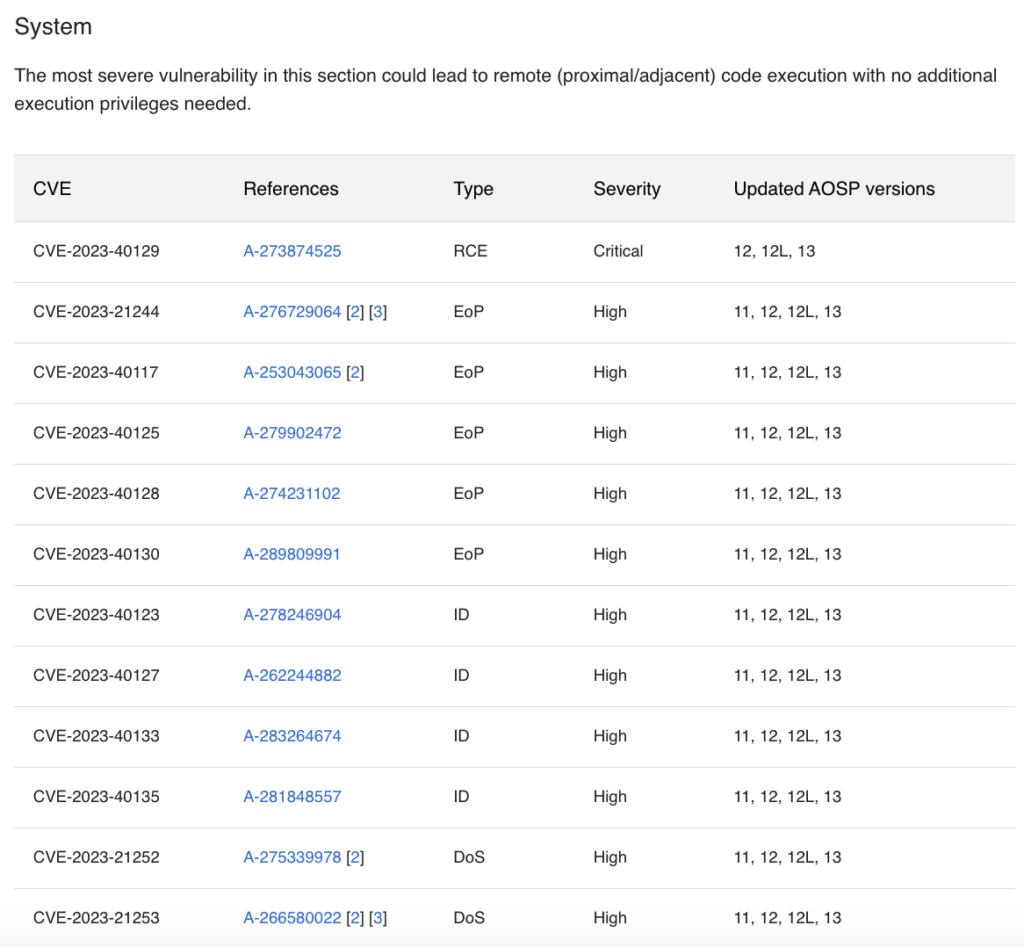In today’s hyper-connected world, Google’s Android stands as the undisputed champion among mobile operating systems, with a 70% market share worldwide and over 95% market share in India. However, the challenge of vulnerabilities in Android OS still persist.
From the iconic Google Pixel to the sleek Samsung Galaxy and even smart feature phones like JioPhone, Android OS has redefined how we communicate, play games, make payments, and do other activities seamlessly. Yet, amidst the allure of convenience and functionality, a pressing concern has arisen – one that has caught the attention of businesses and governments alike: the security of sensitive data. The Indian government has issued a critical warning for Android smartphone users, particularly those on OS versions 11, 12, 12L, and 13.
The Indian Computer Emergency Response Team (CERT-In), under the Ministry of Electronics and Information Technology, has raised the alarm regarding multiple vulnerabilities lurking within the Android smartphone OS. These vulnerabilities, if exploited, could grant unauthorized access to users’ sensitive information such as email ID, phone number, bank account details, personal images and videos.
It is important to note that this is not the first time CERT-In rang an alarm bell, cautioning about the impending vulnerabilities within the Android OS and urging users to prioritize OS updates. Starting from January 2023, like clockwork, every one or two months, CERT-In has issued press releases warning Android smartphone users operating on OS versions 10, 11, 12, 12L, and 13, all marked with severity ratings of either ‘critical’ or ‘high.’
Despite Google’s prompt release of OS updates and security patches, a significant number of Android mobile users often procrastinate updating their OS. The underlying reasons vary from data constraints to storage limitations or simply overlooking the importance of updates. Many times, it’s OEMs who are to be blamed. Unfortunately, this reluctance opens the door to potential exploits on devices running older Android OS versions.
The warning issued by CERT-In isn’t just another cybersecurity bulletin; it’s a spotlight on critical vulnerabilities present across multiple levels of the Android OS. From the Framework and System to Google Play system updates, Arm components, MediaTek components, Unisoc components, Qualcomm components, and Qualcomm closed-source components, the threat landscape is vast and intricate. If these vulnerabilities were to be exploited successfully, they could bestow cybercriminals with the keys to execute arbitrary code such as Backdoor, elevate privileges, access sensitive information, and even disrupt the targeted system’s operation via a denial-of-service (DoS) attack.

To safeguard against such threats and avoid falling victim to potential scams, Android smartphone users are strongly urged to apply the necessary patches as provided by Google.
With each new Android OS release, Google introduces a range of security enhancements aimed at ensuring the safety of smartphone users. For example, one notable improvement in the latest Android 14 OS is the refined Hardware-assisted AddressSanitizer (HWASan), building upon its introduction in Android 10. HWASan is a crucial tool for detecting memory errors, further solidifying its role in preventing bugs from infiltrating Android releases. In addition to bolstering security, Android 14 OS strongly emphasises transparency in data-sharing practices, particularly concerning apps that share location data with third parties.
Moreover, the recent Android 14 update has brought welcome relief to Pixel 7 and Pixel 6 smartphone users who had been grappling with issues such as overheating and battery drain. Even though the company has not provided an official acknowledgement of these issues, user feedback strongly suggests that the most recent update has had a notable and positive effect on the overall user experience for these devices.
Secure your Android Smartphone
It’s essential for Android smartphone users to:
- Prioritize Updates: Regularly update your Android OS and apps. These updates often contain security patches that fix vulnerabilities. Enable automatic updates whenever possible to ensure you’re always protected.
- Download from Trusted Sources: Only install apps from the official Google Play Store or other reputable app stores. Avoid third-party app sources, as they may contain malicious software.
- Use Strong Passwords and Biometrics: Set a strong, unique password for your Android device and enable biometric authentication methods like fingerprint or facial recognition. Avoid easily guessable passwords and patterns. Additionally, enable 2FA for your Google account and other online services. This adds an extra layer of security by requiring a secondary verification method.
- Be Cautious with Permissions: Review app permissions carefully before granting access. Only grant necessary permissions to apps, and consider whether certain permissions are justified.
- Regularly Backup Your Data: Ensure your important data is regularly backed up to a secure location, either through cloud services or local backups. This will protect your data in case of a security incident.
- Avoid Public Wi-Fi for Sensitive Activities: Public Wi-Fi networks can be less secure. Avoid conducting sensitive activities like online banking on public Wi-Fi, and use a virtual private network (VPN) for added security.
- Stay Informed: Keep yourself updated on the latest security threats and best practices for Android security. Knowledge is your best defence.

